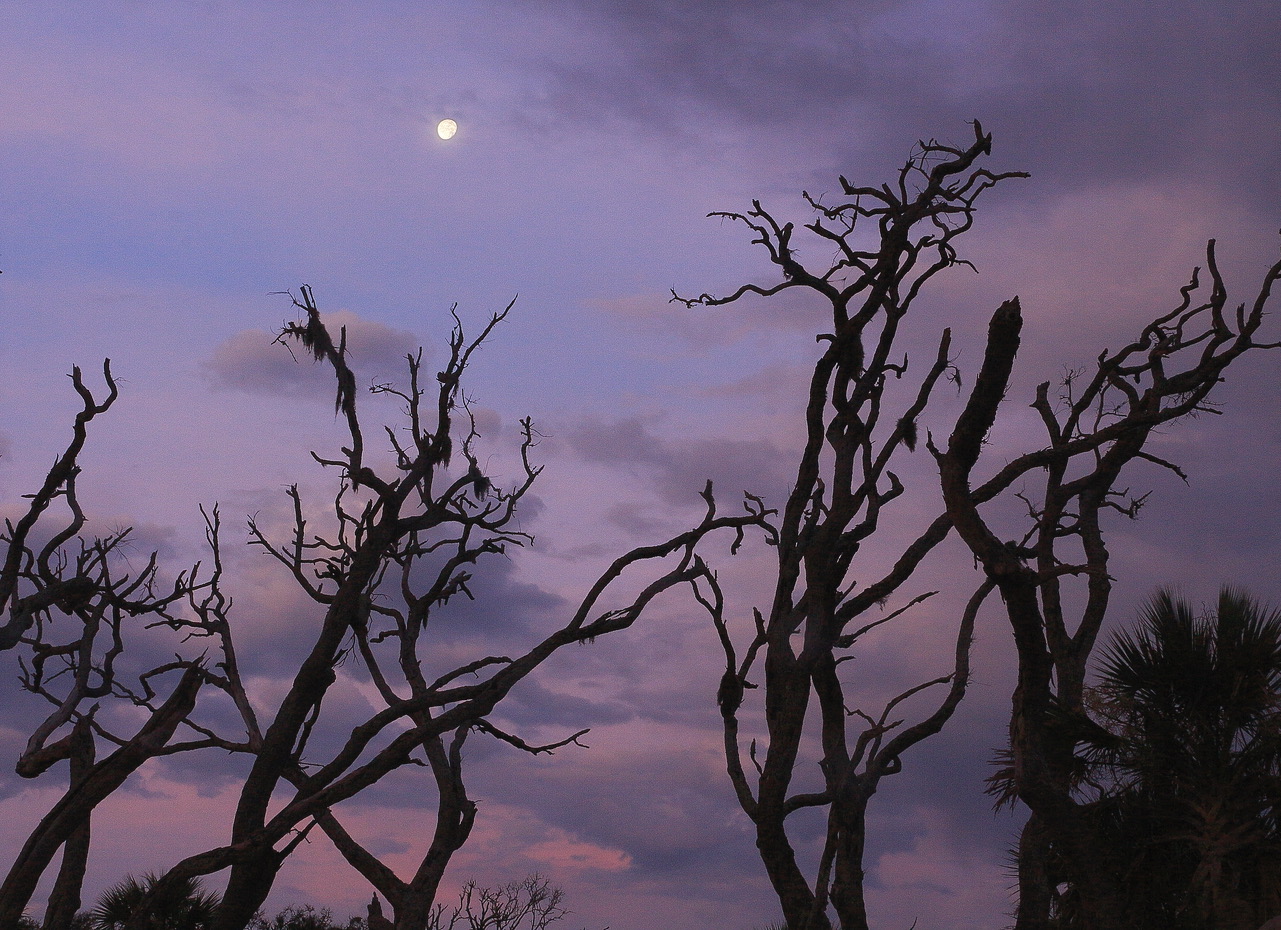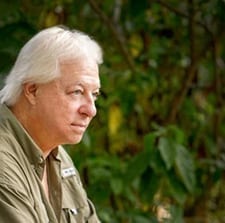A Writer’s Moon Tide Memories
March 16, 2023By Tom Poland
It seems like yesterday though it was forty-five years. I took a job as a scriptwriter-cinematographer with the South Carolina Wildlife and Marine Resources Department. I put my Journalism degree to work, writing film scripts about blackwater rivers, sea turtles, Carolina bays, eastern brown pelicans, and sand dunes. Later I wrote features about fireflies, porpoises, and game management, wildlife that is, not football.
So much has changed since those days; so much water beneath the bridge. Film gave way to video, which gave way to digital video—a seismic shift. Writing on a typewriter gave way to word processors—another seismic shift. And the agency expanded its mission and changed its name to the South Carolina Department of Natural Resources. DNR works fine, doesn’t it writers of today. Three letters instead of forty-nine make room for more insightful subject matter.

Even dead trees feel the pull of the moon.
I spent nine years at DNR, writing for film and South Carolina Wildlife magazine, which brings me to a milestone. In 2024, the magazine will celebrate its 70th anniversary. Nine divided by 70 comes roughly to 13 percent. That’s the share I spent of the magazine’s near 70-year run, but unlike the forgettable writing jobs I’ve had over my so-called career, memories of DNR days cling, gold pollen I can’t quite shake loose. “I remember plenty,” a writer once wrote, and this year some of my columns will recall my wildlife writing years.
I turn the calendar now to the May-June 1985 issue of South Carolina Wildlife magazine. On pages 30-31 a full moon shines through blue moody clouds, a night for werewolves perhaps. The feature’s two-word title says, “Moon Tides.” My story tells how the moon’s pull affects wildlife and our lives more than we realize. Our bodies, metabolism, and emotions feel the moon’s tug. I went on to write stories and other scripts. Restless, a vagabond, I felt a tug, a pull. I left, but all that pollen clung to me.
In the beginning there was the interview. Editor John Culler a tall, lanky Georgian had made SCW into the country’s best conservation magazine. He and Billy DuRant, whom I would work with, grilled me over lunch in West Columbia at the Sunset Grill. It was nothing like Don Henley’s “Sunset Grill,” a song about a mom & pop burger joint its owner had to sell when a Cadillac ran over him. No Cadillac hit me but I felt like it would. Had that job not panned out, I would have returned to my beloved home, Georgia. The Sunset Grill’s food was supposed to be very good—but all I remember is the very last question.
I sat in the back of a Plymouth Fury Commando V8, a police car immortalized in “Hill Street Blues.” Culler and DuRant sat up front ignoring me. Just as we crossed the Congaree River, Culler shot me a Clint Eastwood-like stare. “I’ve just got one more question. Do you like to drink liquor and chase women?”
I knew what to say.
Culler barked to DuRant, “Hire him.”
Soon I was getting familiar with an Arriflex BL, a camera we used to film wildlife. We spent time in freezing blinds well before daylight. We filmed blackwater reflections of autumnal majesty. We flew over Carolina bays. These were the days of remote locations and days upon wild barrier islands, and those days, along with the stories I’d write about tenant homes and more, would grow flowers down the road.
Blame it on moon tides. Blame it on the call of the wild. I returned to writing about nature, and as someone who’s weary of overdevelopment, ever-expanding highways, and plastic, I’m grateful to South Carolina Wildlife magazine. For nigh seventy years it has blessed readers with beauty, nature, conservation, and wisdom. Things needed more than ever. I’m grateful that my words about moon tides, marsh tackies, magnolias, the Chattooga, and a rock & roll environmentalist find a hospitable niche between its covers. I consider it good writing habitat, habitat for rare words and images in an endangered world.
Georgia native Tom Poland writes a weekly column about the South, its people, traditions, lifestyle, and culture and speaks frequently to groups in the South. Governor Henry McMaster conferred the Order of the Palmetto upon Tom, South Carolina’s highest civilian honor, stating, “His work is exceptional to the state.” Poland’s work appears in books, magazines, journals, and newspapers throughout the South.
Visit Tom’s website at www.tompoland.net
Email him at [email protected]






















